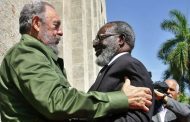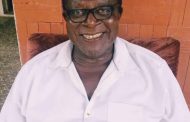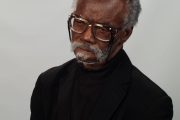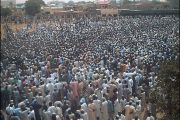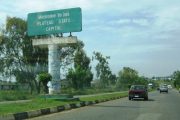The first part of this special report carried the views of the four respondents whose interviews had been transcribed by press time yesterday morning. The first of the voices had been Dr Abubakar Siddique Mohammed, a product of the elite Ecole Des Hautes Etudes en Sciences Sociales, Paris and an energy scholar at Ahmadu Bello University, Zaria’s Department of Political Science. He also runs the Zaria based Centre for Democratic Development, Research and Training, (CEDDERT). The second, Barrister Nankin Bagudu, the Executive Director of Jos based League of Human Rights and a sustained voice on the environmental crisis of tin mining around Jos while the third is Dr Moses Ekpelomo who earned a PhD recently on Nigeria’s energy crisis from the Department of War Studies, King’s College London where he also teaches while the fourth is that of a technocrat, politician and peace advocate, Engineer Mohammed Abba Gana, former Minister for the Federal Capital Territory in Obasanjo’s first term.
Each respondent was aware of the others in the interview conducted separately between July 28th and 30th, 2016. But the presentation of the interviews followed no scientific sequence, made so by technology and the transcribing process.
Dr. Abubakar Sokoto Mohammed brings it to a close in this second part. A left activist, Dr Mohammed was, for decades, was a key resource person with the National Institute for Policy and Strategic Studies, Jos. As the Acting Director of Research of the Federal Government think tank, he circulated in an environment of cross-cutting elite interaction within and beyond Africa. He now teaches in the Department of Sociology, Usmanu Dan Fodio University, Sokoto, aka UDUS.
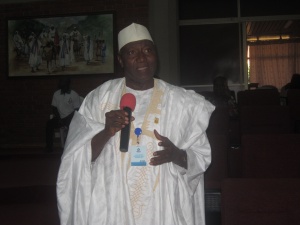
Dr Abubakar Sokoto Mohammed
The subject matter is the classic oil conundrum: On the one hand, the world cannot do without oil. There is nothing or no one oil doesn’t touch and in many, many ways. So, everyone and everything is locked into oil: geopolitics, development, politics, business, religion, culture, war, peace, medicine and, in fact, living and dying. On the other hand, almost everywhere that oil has been found has also experienced conflict and destruction, either of the livelihood of the local people or of the environment; the development of an enclave economy, the neglect of agriculture, intrigues with multinational oil companies and the dangers of the rentier mentality, the precursor of graft. It is such that aloofness from the politics of oil is the beginning of wisdom much as it is as well the greatest act of foolery.
Most students of oil or, more broadly, energy security, would stand by the claim that there is no coup, war, subversion, insurrection, grave intrigue, peacekeeping operation or market volatility anytime, anywhere that oil is not at the heart of it. No one needs more than Daniel Yergin’s two books on oil, (The Prize and The Quest) to prove this claim. Although his own subject matter is different, it is still a reflection of this paradigm that we see in James Smith’s 2009 academic paper “World Oil: Market or Mayhem”. The oil industry is completely and permanently about mayhem, whose synonyms range from chaos to anarchy, bedlam, havoc, turmoil, confusion, disorder and pandemonium. No better word captures the oil industry than mayhem.
The question is against this background and in the context of the renewed efforts to establish that there is oil in the northern part of the country in which oil has been such a mixed bag of blessings and curses. Although the interesting outcome is a consensus among the respondents that Nigeria needs more oil wealth, the respondents offered a kaleidoscope of views, points of departure, caution, emphasis and alternatives policy planks.
You must be aware of the history of determined efforts, including President Buhari’s reported marching orders to the national oil company to step up such efforts as to whether oil exist in the northern part of this country. Based on the history of oil, is this the way for the north to go?
It is not a question of looking at the negative side or the resource curse, how oil is a curse on development and so on. We can look at the positive side. The issue is not turning our back on oil but managing it properly because you need capital to invest in all the other areas of the economy: education, health, infrastructure and industries. Where would the capital come from? Oil could be one. So, the point is yes, there are places where oil has brought disaster but that is because mistakes were made. Here in Nigeria, it is because we collect the revenue or rent from oil and share it without investing it in capital development projects. But there are other places that did not do it like that. If we take Malaysia as our model, they also have oil but they did not solely depend on it to the detriment of rubber and palm oil processing, mining, manufacturing, electronics and services. Instead, their national oil company, PETRONAS, even goes outside their country to prospect for oil. It is a question of foresight and prudent management. Economically, Algeria has done well with its oil wealth. They have constructed heavy industries such as cement, petrochemicals, gas, electrical and food processing. They have also built infrastructure such as roads, power and houses of very high quality comparable to European standards. The comparison between Nigeria and Brazil in industrialization is legendary. Of course Brazil has applied its oil wealth in strategic areas intelligently without neglecting other important sectors of the economy. Here, things are changing. NGOs were not there before, or the social media to put pressure on the political system to uphold the public interest. We should be forward looking and not backwards.
Do we have a ruling elite that can supervise oil wealth?
You can see some islands here and there. Lagos was substantially changed from the dirty, smelly place we knew it. There have been some shifts to develop Lagos into a megapolis with modern infrastructure. The Governor in Kaduna State, Mal. Nasiru El-Rufa’i is there trying to replicate his success story from his tenure as the Minister of the Federal Capital Territory. There are some people that can be focussed. During the commissioning of the Abuja-Kaduna rail project, El-Rufa’i indicated that Kaduna State is negotiating with the Chinese to build a City Rail for Kaduna. These things are overdue because no matter how you widen the roads, there are more and more cars. So, all our major cities; Abuja, Kano, Ibadan, Port Harcourt and so on should have had city railways by now. They are cheaper and more efficient in mass transportation. For instance the economy fare on the new rail from Abuja to Kaduna is 500 Naira whereas the fare by road is N1,500. The speed on the railway will also be faster. Other states in the country such as Gombe, Akwa Ibom, Edo and Katsina have achieved quite a lot of appreciable development with the correct leadership.
Do you think of any specific safeguards that can guarantee that oil will be a blessing in this case?
The point is that we should be optimistic and forward-looking. If the anti-corruption war is successfully executed and sustained, then we should have enlightened leadership that can bargain for us. It should be a win-win arrangement whereby the profits gained by the states and the oil companies should be invested in strategic sectors of the economy especially human resource development, infrastructure and heavy industries. It can be specified that if you are going to build a housing estate, a hospital, a university, it should be of a very high quality in standard. These should be part of the agreements to be negotiated even before the exploitation of the oil and gas resources in the north. That way, you are not repeating the mistake of the past whereby the oil wealth was mismanaged, stolen and squandered.
What do you see happening to federalism in the event of oil find in the northern part of Nigeria?
Northern Nigeria has always been involved in nation building. Oil in northern Nigeria would be an asset to Africa, not just to all of us in Nigeria. So, the secession of the north from Nigeria because of the discovery of oil is out of the question to any intelligent and informed leadership. The north would still need access to the sea and a market. On the other hand, the south would still need the agricultural produce and market of the north. So, I would not connect oil find to a demand for restructuring. The north would get a larger revenue with the principle of derivation, which the oil producing states have been receiving, and the Federation would get increased income from the exploitation of oil, gas and mineral resources from the North. It will be a winning formula for a greater Nigeria rather than balkanizing the African giant.
That’s not where my mind was going. Rather, I was looking at the belief that oil find in the north might strengthen federalism. Are you of the same view?
Well, the availability of oil in the north will make the north to be no longer seen as the parasite of the nation. Instead, the other side will also benefit because all earned revenue goes to the Federal Government. The Federal Government will get more money. It will reduce the tension although the tension as it is now is more of bad politics than anything serious. There is nowhere in the south where you do not find northerners trading in agricultural produce and livestock. It has dawned on the south that the north is contributing its quota in food security and industrial raw materials. The astronomical rise of the prices of foodstuff during the June 12 debacle made this evident to the south especially, Lagos. The prices of beef, tomatoes, onions went up astronomically when it was no longer safe for trucks to go down south. It was that instance that explains today why some of the states in the north are thinking of cargo airports. With cargo airports, stuff such as fresh carrots, cabbage, Irish potatoes, sweet potatoes, tomatoes, onions, yams and the likes from Sokoto, Kano, Makurdi, Jos, etc. can be taken straight to Lagos, Port Harcourt, Calabar and so on as well as other West African destinations. While I was in NIPSS, we undertook Study Tours of African countries. In places such as Sierra Leone or Senegal, you find that they import much of their Irish Potatoes, eggs, chickens and onions from Europe. Meanwhile, the vegetables that we have here in Nigeria are considered to be amazing in quantity and quality. The Israelis observed that the onions from Nigeria are among the best in the world. As agricultural experts their opinion should be respected. These things are much around Sokoto, Kano and many of the northern states. Onions can be exported in powder form after processing in order to prevent wastages. So, we should not to be thinking of Nigeria alone, we should extend to the West African sub-region. When you consider the prospects, you begin to wonder why there is no railway from Kano to Dakar, Lagos to Abidjan. Similarly there should be regular passenger and cargo shipping lines between Lagos and Dakar with stopover at other important ports in between. We are talking of free movement of people and goods in ECOWAS but we are not providing the means of movement. Because of privatisation and mismanagement, most of the national airlines have collapsed. Meanwhile, the international airlines link Africa to Europe only. So, there are gaps to be filled if we want to promote African integration. These are the areas we need to address because it is Nigerians that move most in the region. Without the few private Nigerian Airlines which connect cities in West Africa and beyond, you can see such movement won’t be possible. But the region needs the movement. Look at the impact it produced in Sierra Leone, for example, where the staple food was rice. They will even tell you that any day without rice, something is amiss. It was our soldiers, during the ECOMOG Mission, who introduced gari, beans and yams there. That being so, we should have had a shipping line to export such commodities to the sub-region and beyond.
Actually, the origin of this story was a discussion where one of the positions is the belief that oil would finally destroy the north because oil would kill the region’s badly managed agricultural advantage.
That’s a point. Every day here in Sokoto, truck loads of onions, beans, cattle, sheep, goats, donkeys and now even camels go to the south. Sometimes, the trucks breakdown on the road and they have to throw away the stuff. Apart from our oil and gas, agriculture is Nigeria’s prowess and it is done mostly in the north. But, as I said earlier, if we take Malaysia as our model, even if oil is discovered in the north, it shouldn’t be allowed to kill other strategic sectors of the economy.
But you have to then think of the earlier question I asked, the very core of our elite
That is right. Apart from Abuja, there is nothing positive that we have done with our oil wealth. Yes, we have built universities, hospitals, airports, and all that but of what quality? Are they distinctive and globally competitive? Do you have electricity, internet and efficient transportation? We should search for a new elite that is patriotic, public-spirited, intelligent and well informed to take up leadership and confront the World.
Do you have a central comment or message on this little debate?
If they find oil in the north, priority should be given to popular interests which will serve the majority of the population: education, health, power, water, transport, etc. With the last election, people have become much, much wiser. People will not sit by and allow their resources to be squandered by anybody because money that should have been used for serious investment has been stolen. Apart from the people themselves, the media has become more interactive. Most of the people are more enlightened than some of the leaders. So, making it an all stakeholder rather than just a government or exclusive domain of international oil companies will checkmate the fears of the oil curse. The whole society must be carried along. An estate of 500 houses belonging to just one individual is not development. Where the government builds such estates and sells or allocates them to the public as in Sokoto and other states, this will improve the quality of life of the citizens. And I believe the north should be conscious of its backwardness. If you see the JAMB results and statistics of application into universities, the northern states are doing very poorly. All the okada riders, porters and beggars in the South are from the north. These are people who should be in school. Some states in the north have been sending students abroad but it is a blind policy. In one of the states, they even sent students to train as pilots. Many are back but there is no system for them to fly. So, they are being deployed to teach. It was a huge wastage. The resources should have been used to improve on the educational institutions in the state. We are not organised.




